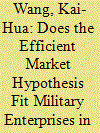|
|
|
Sort Order |
|
|
|
Items / Page
|
|
|
|
|
|
|
| Srl | Item |
| 1 |
ID:
171480


|
|
|
|
|
| Summary/Abstract |
This paper considers bubbles specific to Chinese renewable energy industries, including wind, solar and hydro through the Generalized Supremum Augmented Dickey-Fuller test. It applies the recursive procedure and cross-time occurrence to identify starting and ending points in each bubble. Combining with the bubble model, the empirical results reveal that renewable energy industrial stock price may deviate from their market value, and bubble behaviours exist in these industries. The potential reasons can be contributed to economic growth, trade barrier, government supportive policies, global financial crisis, and environmental protection pressure. More attention is further paid on special factors such as extreme windy weather, unfair anti-dumping investigation and less policy support which can explain certain bubbles in wind, solar and hydro industries. The renewable energy industries' boom and recession that evidence from bubble behaviour, would harm industrial development, influence thousands of people's lives, and bring challenges for Chinese energy structure and policies. Therefore, depending on the timely identification of explosive behaviours and bubbles, policymakers could set up prudent policy framework, reduce government intervention and render firms autonomy to maintain the sustained and healthy development of industries. More importantly, enterprises should increase research and development expenditure, upgrade technical standard and exploit international renewable energy market.
|
|
|
|
|
|
|
|
|
|
|
|
|
|
|
|
| 2 |
ID:
170222


|
|
|
|
|
| Summary/Abstract |
This paper investigates whether the efficient market hypothesis (EMH) fits the Chinese military market using the Sequential Panel Selection Method (SPSM) and the Panel KSS unit root test with a Fourier function. We obtain evidence for structural shifts and non-linearity in the stock prices of the military industry in the Chinese stock market. Because sharp shifts and structural breaks are taken into account, the unit root hypothesis for most listed companies is rejected. Our result suggests that the Chinese military market is inefficient because of such factors as defense reforms, friction in the stock market, and irrational investors. We provide investment implications to enable future stock price movements to be predicted based on past behavior and enable trading strategies to be developed to earn abnormal returns. Meanwhile, Chinese defense enterprises should continue to implement industrial reforms, change their bureaucratic culture, and develop a market-oriented workforce.
|
|
|
|
|
|
|
|
|
|
|
|
|
|
|
|
| 3 |
ID:
178834


|
|
|
|
|
| Summary/Abstract |
This paper investigates the cointegration relationship among crude oil dependence (COD), CO2 emissions (CO2) and military expenditure (ME) in net oil importing countries using a bootstrap autoregressive distributed lag model with a Fourier function (FARDL). The empirical results indicate that there is cointegration in China and India due to their rapid economic development, very high CO2 emissions, strong oil demand and growth in military strength. Italy has a high level of oil dependence and an oil-dominated energy structure and is closely located to the Middle East, leading its ME to be influenced by COD and CO2. However, military strategies and alliances, governmental budget constraints, and energy structure and policies eliminate the cointegration relationship in the U.S., France and other countries. Some policy implications include the need to diversify oil supply channels and build strategic reserves to relieve pressure on the military to protect oil security. Expenditures for military research and development should be encouraged, and the transfer of military technologies to civil fields to improve energy efficiency should be accelerated. Renewable energy development is an effective instrument for relieving pressure due to oil dependence and the need to reduce CO2.
|
|
|
|
|
|
|
|
|
|
|
|
|
|
|
|
|
|
|
|
|